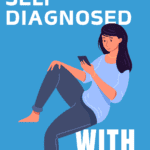Self-diagnosing ADHD is a common trend with adults and parents these days. And for good reason, too. Let’s talk about why many of us feel we have undiagnosed ADHD and what we can do about it.
Difficulty listening, easily angered, misplacing items, and trouble focusing.
No, I am not describing how you may feel on a daily basis. I am actually listing out some of the most common symptoms of adult attention-deficit/hyperactivity disorder (ADHD) according to the CDC.
It’s no surprise that many of us finally feel heard, seen and understood when we read the symptoms of ADHD. The symptom list connects to us like an old friend chatting over coffee.
These ultra-relatable symptoms can be absolutely draining – crushing self-esteem, hurting relationships, and impacting all aspects of your life.
On top of that, ADHD is one of the most common mental health conditions on earth (which research estimates around 7% of adults globally affected and growing).
So, what is leading to the increase in self-diagnosing ADHD?

Disclaimer: If you think you have ADHD or your symptoms are impacting your life please reach out to a healthcare provider.
First, Let’s Understand What ADHD is
ADHD is a mental health disorder linked to imbalances in certain brain chemicals called neurotransmitters, such as dopamine and norepinephrine, according to the AACAP. Norepinephrine plays a role in the body’s stress response and helps to regulate sleep, alertness, and blood pressure. Dopamine plays a key role in movement and affects motivation and pleasure.
There are a lot of different ways these brain chemicals can malfunction. For example, you may not be producing the right amount of these chemicals. On the other hand, if you do things (which we will discuss later) that overload your system with these chemicals, your body may become less sensitive to them.
While these imbalances may have some genetic links, they can be caused by outside environmental factors (this is important).
Your levels and sensitivity to dopamine can be impacted by many things such as screentime, sleep, nutrition and exercise.
So, basically – you aren’t crazy if you feel deep in your bones that you have undiagnosed ADHD.
In fact, our modern day dopamine-draining lifestyles are the perfect formula for ADHD.
Related: Journal prompts for Anxiety Control
What is Causing These ADHD Symptoms?
Our ancestors woke up with the sun, and they got straight to work outside or in close contact with family members. They went to bed when the sun went down. They didn’t fill their bellies with sugar or their minds with social media.
The human body was not designed to live the way most of us live nowadays. Our lifestyles have created a decrease or desensitization to dopamine and norepinephrine – meaning we continually need MORE to have the same reaction we used to have.
Some common reasons our dopamine and norepinephrine are out of whack can include:
- Poor Diet- For example, high saturated fat intake may cause dopamine receptor desensitization
- Alcohol usage – which is on the rise (especially in women) and can initially increase dopamine but over time lead to decreased dopamine levels and receptor sensitivity
- Stress- alters dopamine levels and activity
- Lack of sleep – studies have shown that lack of sleep can reduce dopamine and norepinephrine levels
- Sedentary lifestyle- lack of physical activity, especially aerobic exercise, can cause drops in these neurotransmitters
Did you raise your hand to all or at least some of these things? Most of us can confess to at least some of these issues – leading to an increase in self-diagnosing ADHD.

Also read: How to Raise Mentally Strong Kids
What to do After Self-diagnosing Your ADHD?
Let’s stop the downward spiral into a cycle of non-productivity, then guilt, then more non-productivity that is so commonly felt in ADHD.
If you feel that you are self-diagnosing your ADHD, there are simple lifestyle changes that can adjust your internal chemicals and brain function.
While I said “simple”, these are not quick hacks. These 3 activities take time and consistency to adjust your chemical levels and brain function, so it’s important to start now:
1) Stop Scrolling
Before you curse me out, understand how detrimental phone scrolling is for our brains.
Every time you scroll on your phone, you get a little shot of dopamine. It’s like a little reward each time we pick up our phones.
The problem is – this constant stimulation can create a cycle where the brain becomes conditioned to seek out these dopamine hits, resulting in a desire to check phones frequently and potentially leading to addiction.
To stop this cycle try deleting social media, turning off notifications, or taking time periods (like weekends) off from scrolling. A detox, if you will.

2) Get Healthy
It’s no shocker that you feel more focused and attentive when you are treating your body right.
Proper nutrition and exercise may help some people manage their ADHD symptoms by increasing levels of neurotransmitters in a similar way to ADHD medication.
A few quick tips:
- Focus on a balanced diet: prioritize whole, unprocessed foods, including fruits, vegetables, whole grains, lean proteins, and healthy fats.
- Limit processed foods, sugary drinks, and excessive caffeine: These can exacerbate ADHD symptoms.
- Consider omega-3 fatty acids: Found in fatty fish like salmon and tuna, these may support brain function.
- Ensure adequate iron and zinc intake: These nutrients are important for brain function and may be beneficial for some individuals.
- Regular physical activity can improve focus, reduce hyperactivity, and enhance mood: Aim for at least 30-40 minutes of moderate-intensity exercise most days of the week.
- Consider activities that combine physical movement with mindfulness: Yoga, tai chi, and martial arts can help calm the mind and improve emotional regulation.
- Interact with nature: go on a walk or spend time outdoors
3) Start a New Hobby
Hobbies can be super beneficial for individuals with ADHD.
They can help manage symptoms like inattention and hyperactivity by providing a positive outlet for energy, promoting focus, and reducing boredom.
Additionally, engaging in hobbies can actually boost dopamine levels, and enhance self-esteem, creativity and confidence.
Start with a hobby that is achievable, realistic, and fulfilling.
Related: The Hard Truth About Your People-pleasing Behavior
Final Thoughts on Self-Diagnosing ADHD
Let’s be honest, the medical community hates the word “self-diagnosing” (I know, I am part of it), but it’s a simple fact that these conversations are trending.
There is less negative stigma, a broader understanding, and a rise in the factors that cause brain chemical changes leading to more research, advocacy and awareness.
While you may need a healthcare provider to intervene or medication therapy (which can be necessary in some cases but is harsh to your system), you can make these lifestyle changes starting now and be on a path to focus, connection, and peace.
You may also be interested in the 9 ways I cured my anxiety without medication.
For more family tips, follow us on Facebook.

